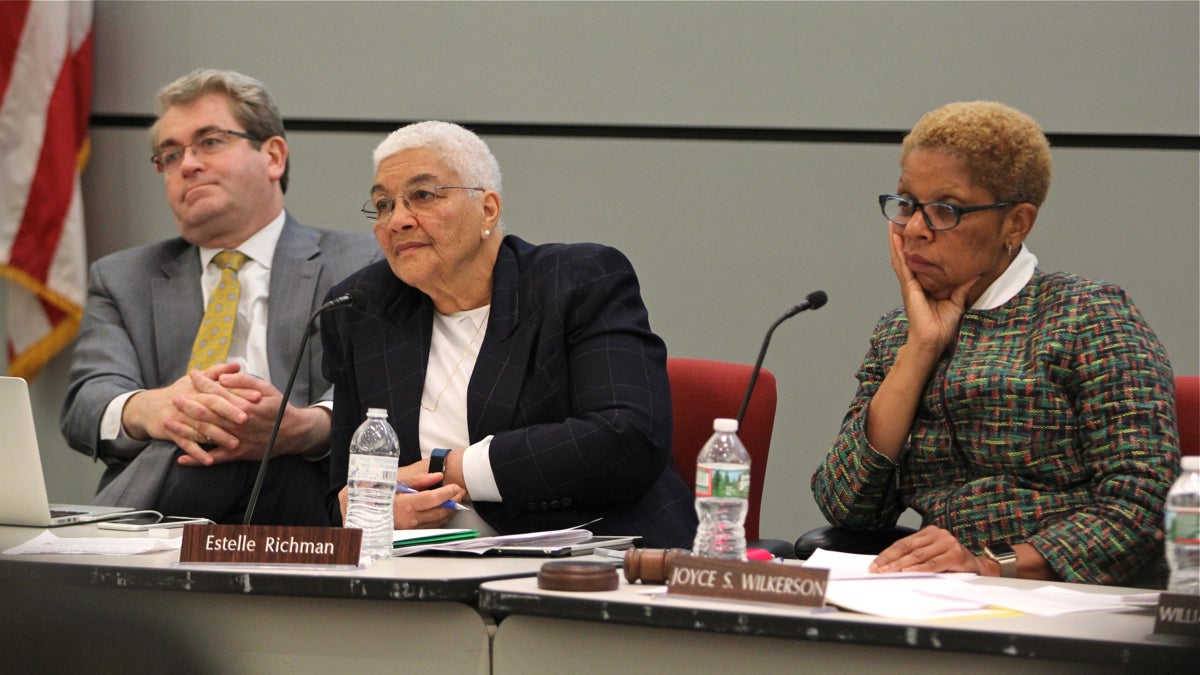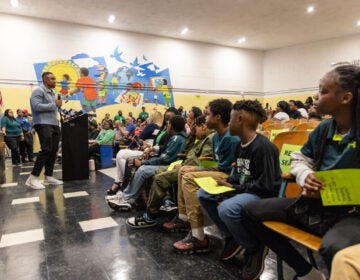Philly approves school budget and a new charter school

Democratic candidates for mayor of Camden debate at Rutgers-Camden University. (Emma Lee/WHYY)
It may prove to be the calm before the storm, but for the second year running Philadelphia’s public school system passed a budget that puts resources back into schools and projects a small, year-end surplus.
The School District of Philadelphia even threw in a bonus on the day the School Reform Commission passed its 2017-18 budget: 18 new bilingual counseling assistants and 11 new English-as-a-second-language teachers. The late additions were partially in response to community requests for more immigrant services.
The district is also adding extra classroom teachers and socking away money to cover gaps created by the Trump administration’s proposed budget, which includes plans to end a federal program the district uses to fund early literacy initiatives.
But as district officials continue to warn, there are fiscal troubles looming.
In fact, the budget passed for the upcoming school year contains slightly higher obligations ($2.950 billion) than it does revenues ($2.949 billion). A small surplus carried over from last year will plug that gap, but by 2019 the district expects rising charter and pension costs to plunge it back into a deficit. Add to that a still-unresolved teacher’s contract, and the district’s relatively drama-free budget season could end up an anomaly.
The budget wasn’t the only item to merit scrutiny at Thursday’s SRC meeting–far from it.
By a 4-1 vote the SRC approved an application for Deep Roots Charter School, a school it previously rejected.
By rule, Deep Roots was allowed to resubmit its application. Several SRC members indicated they felt obligated to approve Deep Roots because the revised application met all requirements for new charters under state law. Recently installed SRC member Estelle Richman said rejecting the application would likely trigger an appeal that would drain time and resources.
In a presentation before the SRC, DawnLynne Kacer, head of the Charter Schools Office, said Deep Roots made small adjustments to its resubmitted application. The applicants included more evidence of community engagement, a better staffing plan for special education students and English language learners, and a more robust set of socio-emotional supports that included hiring social workers.
Deep Roots plans to occupy the old Sheridan West School in the Harrowgate neighborhood. It will eventually serve grades K-8 and enroll 540 students. The school’s mission is to prepare low-income children for what it calls in its application “selective” or “top-tier” colleges.
Christopher McGinley, the only SRC commissioner to vote against the application, said he was concerned with an elementary school so explicitly focused on college outcomes.
Deep Roots was one of only three applications to go through the entire selection process for new charter schools this cycle. Of the remaining two, one, Friendship Whittier, was rejected and the other, KIPP Parkside, was approved.
The SRC also voted to extend lease agreements for a pair of Center City high schools: Constitution High School and Science Leadership Academy (SLA).
The latter prompted fierce pushback from members of the school community, who expected their school to receive a two-year lease extension, but ended up receiving one year.
SLA, located at 22nd and Arch, has become one of the city’s most celebrated and desirable magnet schools since its opening just over a decade ago. Part of the appeal has been the school’s relationship with the nearby Franklin Institute and its accessibility from all points of the city.
But that accessibility comes at a cost of $1.5 million a year, the rate Philadelphians pay to lease a prime piece of real estate from 2130 Arch Street Associates, L.P.
The district maintains it cannot afford to lease such a pricey building long-term. Many SLA students and parents, however, adamantly want the school to remain downtown, even if that means finding another site in Center City.
“We’re not like an elitist, white, privileged community. We’re a diverse community of students from all across the city,” said SLA student Luke Risher. “We’re only that because of the central location.”
Risher and others say that in previous interactions with the district they were led to believe the SRC would extend the lease on SLA’s current location for two years. Instead, the district approved a one-year extension that will allow the school to stay put through the end of the 2018-19 school year.
Fran Burns, the district’s Chief Operating Officer, said she’s not aware of the district ever promising students a two-year lease extension.
Prior to Thursday’s SRC hearing, Councilwoman Helen Gym held a rally outside school district headquarters to push for more instrumental music instruction. Data analyzed by Gym’s office and published by Newsworks/WHYY showed nearly a quarter of Philadelphia public schools do not have instrumental music instruction provided by the district. Gym’s office found that schools serving disproportionately high numbers of minority students were most likely to be without instrumental music.
At the Thursday rally, Gym called on the district to make instrumental music available in all schools.
“We really do need to see a plan to end the racial disparity around instrumental music,” said Gym.
The district did announce its adding seven more itinerant instrumental music teachers, bringing its total to 73.
During the SRC meeting, Commissioner Bill Green took a veiled swipe at Gym and other city council members who push the district to spend more by noting that the city could pour more of its money into Philly schools. He specifically called on council members to create amendments in the city budget that would cover the major items they ask the school district to fund.
“Certainly council people have the option of putting their money where their mouth is,” said Green.
Asked about those comments afterward, Gym said the city has stepped up, most notably with a commercial property reassessment that will pump an extra $65 million annually into district coffers. She also argued it would be overreach for council to appropriate specific funds for specific district expenses.
Earlier in the budget season, SRC members called on the district to create a supplemental budget that would demonstrate how much money Philadelphia schools would require if they were adequately funded.
The district has yet to produce that document, and Green hinted at why during Thursday’s SRC meeting. He noted that if the district were to define adequacy in an official document, it could undercut or interfere with an ongoing state lawsuit that argues under-resourced school districts like Philadelphia don’t receive proper funding from the state.
WHYY is your source for fact-based, in-depth journalism and information. As a nonprofit organization, we rely on financial support from readers like you. Please give today.





